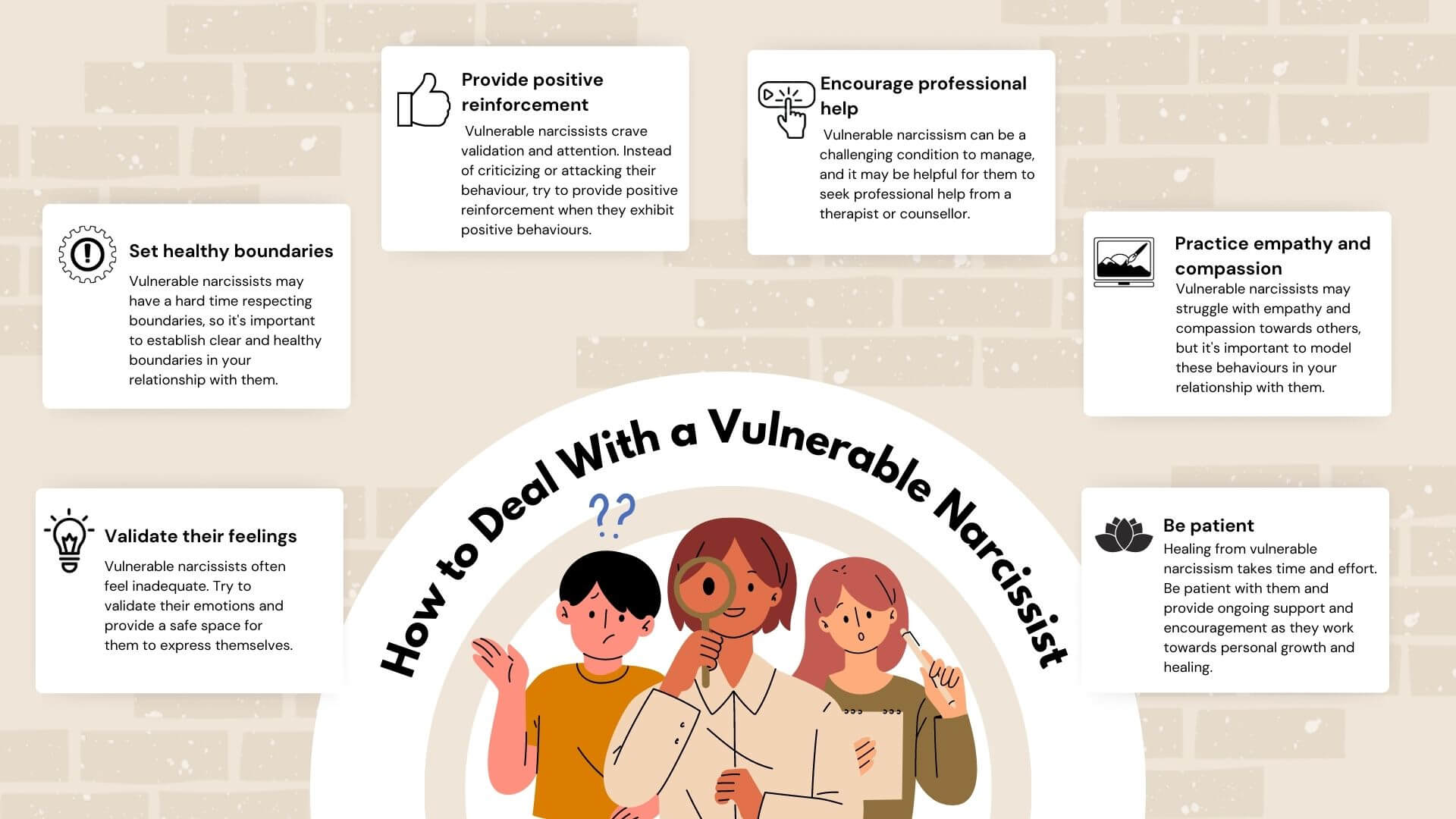
As humans, we all have our fears and insecurities, and this includes narcissists. However, vulnerable narcissists are often overlooked when it comes to discussing their fears. In this article, I will explore what vulnerable narcissists fear, how it impacts their behaviour, and a deeper look into the underlying question faced by many “Can a vulnerable narcissist change”?
In This Article
ToggleUnderstanding Vulnerable Narcissism
Common narcissistic signs include a deep need for attention and admiration, a strong sense of entitlement, a lack of empathy, selfishness, and manipulation. With that in mind, let’s define what vulnerable narcissism is. Vulnerable narcissism is a subtype of narcissism characterized by feelings of inadequacy, vulnerability, and hypersensitivity to criticism. Unlike grandiose narcissists, who have an inflated sense of self-importance and are often aggressive and exploitative, vulnerable narcissists are more introverted and self-deprecating.
Harvard lecturer Craig Malkin, PhD claims that a noticeable feature of vulnerable narcissists is that they feel that their pain is more important than others as they have “suffered the most”. Furthermore, they believe this to be true so they tend to suffer severely from these often exaggerated issues.
10 world-class mindset shifts that will…
~ Accelerate your success.
~ Bring out your inner genius.
~ Create a lasting impact on your happiness.
Price From: $11.49
What Vulnerable Narcissists Fear
Despite their more subdued behaviour, vulnerable narcissists still have fears and insecurities. Here are some of the things they fear the most:
Rejection – Vulnerable narcissists fear rejection more than anything else. They fear that they are not good enough and that others will reject them.
Abandonment – Vulnerable narcissists also fear abandonment. They have an intense need for love and validation, and the thought of being alone terrifies them.
Criticism – Vulnerable narcissists are hypersensitive to criticism. They fear being criticized and rejected for their perceived shortcomings.
Failure – Vulnerable narcissists fear failure. They have a strong desire to succeed, but they also have a deep fear of failure.
Intimacy – Vulnerable narcissists fear intimacy. They have a hard time letting others get close to them and fear being vulnerable.
How These Fears Impact Behaviour
Vulnerable narcissists’ fears impact their behaviour in several ways. For example, their fear of rejection and abandonment may lead them to seek constant validation and attention from others. They may also become overly dependent on their partner or friends, fearing that they will be left alone if they don’t do everything in their power to keep them around.
Their fear of criticism may lead them to avoid situations where they might be criticized. They may also become defensive or aggressive when they feel criticized or rejected, lashing out at others in an attempt to protect themselves.
Their fear of failure may lead them to avoid taking risks or trying new things. They may also become overly competitive, feeling the need to prove themselves and their worth to others.
Finally, their fear of intimacy may lead them to avoid emotional closeness with others. They may struggle to form deep connections with others, preferring to keep relationships superficial and shallow.
How to Deal With a Vulnerable Narcissist

Dealing with vulnerable narcissists can be challenging, but there are ways to effectively manage their behaviour and support them in their journey towards healing. Here are some tips on how to deal with vulnerable narcissists:
Validate their feelings – Vulnerable narcissists often feel inadequate and insecure. Instead of dismissing their feelings or telling them to “just get over it,” try to validate their emotions and provide a safe space for them to express themselves.
Set healthy boundaries – Vulnerable narcissists may have a hard time respecting boundaries, so it’s important to establish clear and healthy boundaries in your relationship with them. Let them know what behaviour is and is not acceptable and enforce consequences if necessary.
Provide positive reinforcement – Vulnerable narcissists crave validation and attention. Instead of criticizing or attacking their behaviour, try to provide positive reinforcement and praise them when they exhibit positive behaviours.
Encourage professional help – Vulnerable narcissism can be a challenging condition to manage, and it may be helpful for them to seek professional help from a therapist or counsellor. Encourage them to seek help and provide support throughout the process.
Practice empathy and compassion – Vulnerable narcissists may struggle with empathy and compassion towards others, but it’s important to model these behaviours in your relationship with them. Try to understand their perspective and provide support and compassion when they are struggling.
Be patient – Healing from vulnerable narcissism takes time and effort. Be patient with them and provide ongoing support and encouragement as they work towards personal growth and healing.
In summary, dealing with vulnerable narcissists requires patience, understanding, and clear boundaries. By providing validation, positive reinforcement, and encouraging professional help, you can support them in their journey towards healing and personal growth.
Am I a Vulnerable Narcissist?
If you think you may be a vulnerable narcissist, it’s important to take steps towards self-awareness and personal growth. Here are some tips on what to do if you suspect you are a vulnerable narcissist:
Seek professional help – Consider speaking with a therapist or counsellor who can help you understand your behaviour and work towards personal growth and healing.
Practice self-reflection – Take time to reflect on your thoughts, feelings, and behaviours. Try to identify patterns of behaviour that may be indicative of vulnerable narcissism and work towards changing those behaviours. This will improve your overall emotional intelligence.
Focus on empathy and compassion – Vulnerable narcissists may struggle with empathy and compassion towards others. Practice putting yourself in other people’s shoes and try to understand their perspective.
Learn healthy coping mechanisms – Vulnerable narcissists may rely on unhealthy coping mechanisms, such as avoidance or denial. Work on developing healthy coping mechanisms, such as mindfulness, meditation, or exercise.
Seek support from loved ones – Reach out to trusted friends and family members who can provide support and encouragement as you work towards personal growth and healing.
It’s important to remember that vulnerability and personal growth take time and effort. Be patient with yourself and focus on making small, positive changes towards self-awareness and personal growth. With professional help and support from loved ones, you can overcome vulnerable narcissism and work towards a healthier, more fulfilling life.
How To Stop Being a Vulnerable Narcissist
Knowing how to stop being a vulnerable narcissist involves a combination of self-awareness, self-reflection, and personal growth. Recognising the tendencies of seeking validation and feeling inadequate is crucial. Engaging in introspection can help uncover the root causes of these behaviours, often linked to past experiences or insecurities. Practising empathy and active listening towards others fosters healthier relationships and diminishes self-centred tendencies. Shifting focus from self-absorption to genuine interest in others’ well-being aids in breaking the narcissistic cycle.
Developing a sense of self-worth independent of external validation is pivotal in learning how to overcome vulnerable narcissism. Setting realistic goals and acknowledging achievements without seeking constant praise fosters a healthier self-esteem. Embracing constructive criticism and learning from mistakes is instrumental in personal growth. Mindfulness and meditation can assist in managing negative thought patterns and impulses.
Here’s what to do if you are a vulnerable narcissist. Professional help, such as therapy, is valuable in addressing deep-seated issues and gaining tools for change. Cultivating meaningful connections based on mutual respect and support helps in redefining one’s identity beyond narcissistic traits. Ultimately, transforming from a vulnerable narcissist entails dedication to personal development, a genuine desire for change, and persistent effort to cultivate humility and authenticity.
How a Life Coach Can Help
A life coach can play an important role in recognising how to help a vulnerable narcissist or if an individual suspects they are a vulnerable narcissist. Here are some ways in which a life coach can offer support:
Helping someone associated with a vulnerable narcissist – A life coach can provide a safe space for someone who is associated with a vulnerable narcissist to express their feelings and work through their emotions. They can provide support and guidance on setting healthy boundaries, managing difficult conversations, and identifying strategies for self-care.
Helping someone who suspects they are a vulnerable narcissist – A life coach can work with someone who suspects they are a vulnerable narcissist to understand their behaviour and develop strategies for personal growth and healing. They can guide building self-awareness, developing healthy coping mechanisms, and practising empathy and compassion towards others.
Providing accountability and support – A life coach can serve as a source of accountability and support for someone who is working towards personal growth and healing. They can help set goals, monitor progress, and provide encouragement and support throughout the process.
Referring to other professionals – If a life coach believes that someone would benefit from professional help, they can provide referrals to therapists, counsellors, or other healthcare professionals who can offer specialized support.
In summary, a life coach can offer valuable support for someone who is associated with a vulnerable narcissist and also, someone who suspects they are a vulnerable narcissist. By providing a safe space for expression, guidance on healthy behaviour and personal growth, and accountability and support, a life coach can help individuals overcome vulnerable narcissism and work towards a healthier, more fulfilling life.
Conclusion
In conclusion, vulnerable narcissists have fears and insecurities just like everyone else. Their fears of rejection, abandonment, criticism, failure, and intimacy impact their behaviour and can make it difficult for them to form deep, meaningful connections with others. By understanding these fears, we can better empathize with and support vulnerable narcissists in their journey toward healing and personal growth.

Interested in what I do?

Donovan – Life Coach – 078 952 0328





